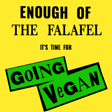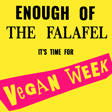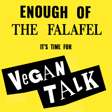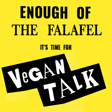
225- How can vegans make better decisions?
In many ways 'Open Philanthropy' & 'Effective Altruism' aren't new concepts; moreover, these philosphical approaches to one's veganism (or just general decision-making) aren't the sexiest of phrases either. However, in many ways they are central concepts that hold an extra impetus when thinking about social justice and how we can use our limited resources to affect the biggest positive change.
In this episode, Carlos, Dominic & Ant examine the work of https://www.effectivealtruism.org/ and https://www.openphilanthropy.org/ discussing the philopshires as a whole, as well as how the lenses can be applied to living life as a vegan.
As ever, we love hearing your views on the topics under discussion (or anything else!) so do drop us your thoughts via enoughofthefalafel@gmail.com
*************
Enough of the Falafel is a community of people who love keeping on top of the latest news in the world of veganism & animal rights. With the Vegan Talk podcast, we aim to develop listeners' (& our own) thoughts around key issues affecting veganism & the animal rights movement; giving our opinions, whilst staying balanced; remaining true to our vegan ethics, whilst constantly seeking to grow & develop.
Each week we home in on one topic in particular and pick it apart in more detail. If you have a suggestion for a future show, do get in touch via enoughofthefalafel@gmail.com.
*******************
Thanks everyone for listening; give us a rating and drop us a message to say "hi"; it'll make our day!
Carlos, Dominic & Anthony



